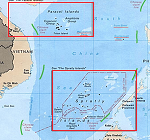While the western powers struggle to reverse Russia’s purported annexation of Crimea in (post-revolutionary) Ukraine, many in East Asia, in turn, are concerned by China’s increasingly aggressive efforts at securing disputed features in the South China Sea.
With the Obama administration and its European partners embroiled in a herculean effort to hammer out calibrated economic sanctions against Russia, China has rejected any efforts to isolate Moscow on the Ukraine issue, choosing to focus on its own “historical” claims in the Western Pacific. And there are growing indications that Beijing is willing to go the distance to assert its newfound geopolitical confidence in the region.
During the recently held annual session of the National People’s Congress (NPC), China’s parliamentary body, the top leadership expressed its commitment to further raise its defence budget by 12.2% – with a particular focus on naval capabilities. Domestically, the Communist Party’s support for an increasingly powerful military resonates with much of the population, as popular nationalism becomes the pre-eminent unifying force in China.
Externally, China’s investment in naval capabilities allows it to project hard power beyond its immediate borders, making it not just an economic powerhouse, but also a legitimate geopolitical force on the global stage. It also enables Beijing to exert influence on the flow of precious commodities and hydrocarbon products across the Sea Lines of Communication (SLOC) in the Indian and Pacific oceans–a crucial element in its energy security policy. Above all, China’s enhanced blue-water naval capability portends a systematic effort at challenging the U.S.’s domination of Beijing’s adjacent waters.
But China’s clamor for respect and recognition, its drive for achieving maximum energy security, and the Communist Party’s increased accommodation of nationalistic sentiments, have come at the expense of neighbouring countries. And there are growing fears that China’s territorial maneuvering could ignite a devastating conflict in the Western Pacific, which is an artery of global trade.
China kicked off the year with a bang, introducing new maritime regulations that require foreign fishing-related vessels to secure the permission of local authorities before entering China’s claimed maritime jurisdiction. There are growing reports that Beijing is contemplating an Air Defense Identification Zone (ADIZ) in the South China Sea. China’s critics claim it is trying to consolidate its claims in the area by gradually imposing control on both maritime and aerial spaces.
In the second week of March, when the international attention was focused on the referendum in Crimea, China called on Manila to evacuate its troops from the Second Thomas Shoal, which is close to the hydrocarbon-rich areas off the coast of Palawan in the South China Sea. China reportedly imposed a naval blockade against the Philippine forces in the area, forcing a change in the status quo. Philippine forces had been occupying the Second Thomas Shoal since 1999 and before the signing of the 2002 Declaration on the Conduct of Parties in the South China Sea.
Back in mid-2012, the Philippines and China came close to an armed conflict over the Scarborough Shoal, a disputed territory in the South China Sea. It eventually lost the territory to China. The Philippines has approached a United Nations arbitration tribunal in The Hague and legally challenged China’s occupation of the Scarborough Shoal. Filipino officials claim that the Xi Jinping administration has repeatedly turned down requests by Philippine President Benigno Aquino to arrange high-level bilateral dialogues to discuss the issue.
China’s assertiveness seems to have provoked a counter-alliance in the region. In a departure from their earlier statements of qualified neutrality on the territorial disputes in the South China Sea, American officials, in recent months, have criticised China’s claims and promised to come to Manila’s rescue in the event of a conflict in the South China Sea.
Meanwhile, Japan, Vietnam, and the Philippines have engaged in a more institutionalised process of coordinating their positions in the Western Pacific, while there is growing hope that India – given its territorial anxieties towards China and its joint energy investments with Vietnam in the South China Sea – will pitch in once a new government takes charge after the elections.
Richard Javad Heydarian is a political science and international affairs lecturer at Ateneo De Manila University, and a policy advisor at the Philippine House of Representatives.
This article was exclusively written for Gateway House: Indian Council on Global Relations. You can read more exclusive content here.
For interview requests with the author, or for permission to republish, please contact outreach@gatewayhouse.in.
© Copyright 2014 Gateway House: Indian Council on Global Relations. All rights reserved. Any unauthorized copying or reproduction is strictly prohibited


